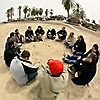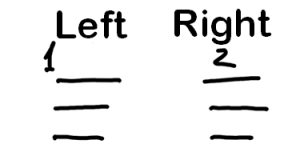
The Creator shows man the extent to which he is incapable of going against nature, egoism. This continues until man realizes that he is completely helpless in the face of egoism. Yet the efforts he has invested do not allow him to leave the work.
All he can do then is turn to the Creator—and this request saves him!
Man sees that he doesn’t move forward toward the goal, but becomes worse and moves further away from it. This is the process of correction: it proceeds from an easier correction to an increasingly more difficult one. Hence hardening of the path is a sign of progress!
The prohibition not to worship and serve idols means the prohibition of making any actions “for myself,” the intention to fill my egoism. This is the main prohibition of real Judaism, Kabbalah. Idol worship is serving one’s egoism! It can be checked by the intention of any action!
What is an action (Maase)?
-It is written, “Make Me a Temple—and I will dwell in it”
Making a Temple is the action, Maase, that we must perform—together! This means gathering the broken soul of Adam by the action of “love the neighbor” so the Creator will then fill it in “love for Him.”
From above it is revealed how immersed man is in egoism and how far he is from the quality of bestowal. It even seems like he became more egoistic. In reality, however, greater truth was revealed to him and hence he sees his work as being more difficult.
But it’s the Creator who came closer—and hence man sees that he is still far from bestowal.
Our entire work must come down to acquiring the will to bestow and delighting the Creator. Everything else shouldn’t interest us.
How do we juxtapose the Creator’s desire to fulfill us, i.e., to receive from Him—with His demand for us to be in the will to bestow?
There are two obstacles to attaining the goal:
-decreased importance of the goal, the Creator
-deceased yearning for the Creator, Isra-El, the mission.
The nations will find out about this from the dissemination of the wisdom of Kabbalah in the whole world. Hence dissemination of Kabbalah is necessary.
There is a condition that all the nations of the world will come to know the Torah, “and the earth will be filled with knowledge of the Creator,” since Pharaoh found out about their mission and hence let them go.
If Egyptians didn’t pressure the people coming out of Egypt, the people would not have left since there was a raging sea ahead of them—and spears and arrows behind them. This forced the people to flee the exile—to part ways with egoism.
Hence it is written that Pharaoh brought them closer to the Creator.
The Creator made egoism so man would fight it, recognize his own inability, but not lose the desire to fill the Creator—and that means to ask the Creator for help and thus attain unity with the Creator.
The Creator evokes the hardening of the heart deliberately to elicit a request for help, a Kli, a need for the Creator’s help since one sees how helpless he is to help himself.
Precisely when man sees that he is unable to overcome the evil of egoism in him—this is the right time to turn to the Creator for help.
The Creator to Moses: Let’s go to Pharaoh—I have toughened his heart. See for yourself how great is the evil of his egoism—there is no way for you to defeat it, but ask Me—and you will gain new desires and thoughts, a Soul that I can fill.
The Creator reveals evil in a person and the Creator corrects this evil. But it’s important for man to reveal the evil in him on his own—to discover the impossibility of correcting it on his own, and then to beg the Creator to eradicate the evil in him, with the Creator’s help.
In love of friends one can always check oneself—whether he has love for them. Whereas love for the Creator is not subject to this kind of scrutiny—whether one has the intention of loving the Creator, bestowal to the Creator rather than one’s own benefit.
The purpose of life lies in adhesion, attained by equivalence to the Creator, which is attained by lack of thoughts about yourself—and then by good thoughts about others, how to fulfill them with everything they need. That’s how one attains adhesion with the Creator.
The feelings with which one turns to the Creator must be completely equivalent to one’s feelings for the friends. For they must be in complete bestowal—LISHMA. That means both types of love unite into one quality.
Adhesion with the Creator happens in 2 stages: exit from myself, self-love, egoism and entry into the Creator, bestowal, altruism. Hence this commandment is observed primarily between people. It’s the only way to gain qualities to come out of yourself and unite with another.
The condition “from love of friends to love of the Creator” speaks of our lack of love for anyone and anything outside of us, but only for ourselves. Hence we must gain exit from ourselves—and we were given the group for that. With this, we can already gain love for the Creator.
We cannot form love for the Creator in us other than by forming love for friends. Although it seems to us that we know what is love and what it is to love, yet when we exert in the group we reveal how unfamiliar and alien this quality is to us!
Man cannot attain love of the Creator before he attains love of friends.
Rabash, v. 1, Bo El Paro – 2
Goodness can be revealed in the world only in our desires of mutual bestowal. To correct egoism to bestowal, we were given Torah and Commandments. And we were given the general commandment of the whole Torah, “Love your neighbor as yourself”—we achieve it in love of friends.
The purpose of life is to attain equivalence to the Creator, which means to fill the creatures with goodness (Leitiv Le Nivraav). More precisely, to help them attain the opportunity to receive fulfillment from the Creator. This is possible when everyone assembles together—then they can bless the Creator for goodness.
The Creator’s greatness should allow me to only bestow everything. This is called living in faith, the quality of Bina. Then one’s body, i.e., spiritual body—thoughts and desires—feel the Creator’s greatness and are completely subjugated to Him.
What matters most is to acquire faith—the will to bestow. This must be the only goal and reward for everything one does.
And ask the Creator only for this.
After realizing our state as “for myself,” we build the state above us, beyond calculation for myself, annulling and sensing the greatness of the Host, forgetting myself, in LISHMA, everything for the Creator’s sake, all thoughts are in Him, and I seem to disappear—this is “bestowal for the sake of bestowal,” Bina.
One has to see the 49 gates of impurity that Isra-El were in upon leaving Egypt as great wealth for the sake of which they were in exile in egoism—Egypt. Only once they’ve collected all the ego-desires did they merit the light of the Creator, and rise above these ego-desires.
Isra-El are weak desires. To reveal the light of the Creator great desires are needed. Thus, Isra-El is forced to unite with egoism. But the ego-Egyptians take the light of the Creator from them, 7 years of plenty. Until the 49 gates of impurity at the time of exodus.
Then the Creator becomes revealed!
One’s exodus from egoism is like fleeing, because only those striving for the Creator, Isra-El, get liberated from egoism, while the other desires stay with him.
Liberated desires rise from Egypt toward bestowal, and later, through them, all other desires get corrected.
Opponents of spiritual development are called “Fearful of the Creator, Workers of Pharaoh.” They are against unity, against working for bestowal, but they are meticulous in their execution because they work for themselves and care only about acting for the sake of egoistic reward
Despite the fact that in order to liberate from the power of egoism the Creator comes through in full revelation and thus a person breaks free from the power of egoism, the person himself seeks to remain in full faith above knowledge, in complete bestowal to the Creator.
To escape the power of egoism it is necessary to reveal its full power over Israel-El, the striving of man toward the Creator. Then the liberation by the Creator will be a miracle! One must believe in the liberation from the power of egoism by the Creator and strive for it only for the sake of the Creator, “Li-Shma,” to please the Creator.
In the future ego-liberation of the world, we will be free from all the ego forces, Pharaoh’s enslaving the world, and the Creator will manifest Himself as the only power in the world throughout everything, before everyone.
Before leaving Egypt, a person is in the lowest ego state, in 49 gates of impurity. Once the Creator becomes revealed to him, the person realizes that there is no other force except the Creator, and this awareness of “There is none else besides Him” brings him out of ego-bondage.
From Twitter, 4/28/19
Related Material:
My Thoughts On Twitter 4/25/19
My Thoughts On Twitter 4/24/19
My Thoughts On Twitter 4/23/19
Filed under: Thoughts on Twitter - No Comments →
 Question: When we read the original sources together with a friend or in a group, do we need to conduct workshops in order to better understand the meaning of the text?
Question: When we read the original sources together with a friend or in a group, do we need to conduct workshops in order to better understand the meaning of the text?












